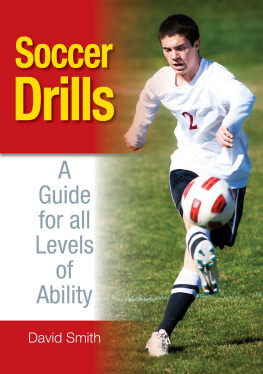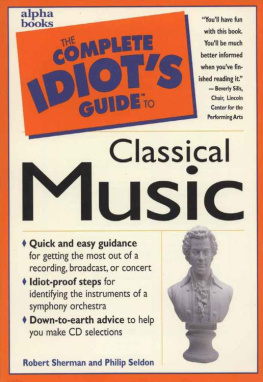DAVID SMITH - Control Systems for Complete Idiots (Electrical Engineering for Complete Idiots)
Here you can read online DAVID SMITH - Control Systems for Complete Idiots (Electrical Engineering for Complete Idiots) full text of the book (entire story) in english for free. Download pdf and epub, get meaning, cover and reviews about this ebook. year: 2018, genre: Computer. Description of the work, (preface) as well as reviews are available. Best literature library LitArk.com created for fans of good reading and offers a wide selection of genres:
Romance novel
Science fiction
Adventure
Detective
Science
History
Home and family
Prose
Art
Politics
Computer
Non-fiction
Religion
Business
Children
Humor
Choose a favorite category and find really read worthwhile books. Enjoy immersion in the world of imagination, feel the emotions of the characters or learn something new for yourself, make an fascinating discovery.

- Book:Control Systems for Complete Idiots (Electrical Engineering for Complete Idiots)
- Author:
- Genre:
- Year:2018
- Rating:5 / 5
- Favourites:Add to favourites
- Your mark:
- 100
- 1
- 2
- 3
- 4
- 5
Control Systems for Complete Idiots (Electrical Engineering for Complete Idiots): summary, description and annotation
We offer to read an annotation, description, summary or preface (depends on what the author of the book "Control Systems for Complete Idiots (Electrical Engineering for Complete Idiots)" wrote himself). If you haven't found the necessary information about the book — write in the comments, we will try to find it.
Control Systems for Complete Idiots (Electrical Engineering for Complete Idiots) — read online for free the complete book (whole text) full work
Below is the text of the book, divided by pages. System saving the place of the last page read, allows you to conveniently read the book "Control Systems for Complete Idiots (Electrical Engineering for Complete Idiots)" online for free, without having to search again every time where you left off. Put a bookmark, and you can go to the page where you finished reading at any time.
Font size:
Interval:
Bookmark:
Control Systems for Complete Idiots
by David Smith
All Rights Reserved. No part of this publication may be reproduced in any form or by any means, including scanning, photocopying, or otherwise without prior written permission of the copyright holder. Copyright 2018
Other books in the Series:
Arduino for Complete Idiots
Digital Signal Processing for Complete Idiots
Circuit Analysis for Complete Idiots
Basic Electronics for Complete Idiots
Electromagnetic Theory for Complete Idiots
Digital Electronics for Complete Idiots
Table of Contents
PREFACE
In this day and age everything around us is automatic and our desire to automate more stuff is only increasing. Control systems finds its applications in everything you can possibly think of. The concept of Control system plays an important role in the working of, everything from home appliances to guided missiles to self-driving cars. These are just the examples of Control systems we create. Control systems also exist in nature. Within our own body, there are numerous control systems, such as the pancreas, which regulate our blood sugar. In the most abstract sense it is possible to consider every physical object a control system. Hence from an engineering perspective, it is absolutely crucial to be familiar with the analysis and designing methods of such Control systems. Control systems is one of those subjects that go beyond a particular branch of engineering. Control systems find its application in Mechanical, Electrical, Electronics, Civil Engineering and many other branches of engineering. Although this book is written in an Electrical engineering context, we are sure that others can also easily follow the topics and learn a thing or two about Control systems.
In this book we provide a concise introduction into classical Control theory. A basic knowledge of Calculus and some Physics are the only prerequisites required to follow the topics discussed in the book. In this book, We've tried to explain the various fundamental concepts of Control Theory in an intuitive manner with minimum math. Also, We've tried to connect the various topics with real life situations wherever possible. This way even first timers can learn the basics of Control systems with minimum effort. Hopefully the students will enjoy this different approach to Control Systems. The various concepts of the subject are arranged logically and explained in a simple reader-friendly language with MATLAB examples.
This book is not meant to be a replacement for those standard Control systems textbooks, rather this book should be viewed as an introductory text for beginners to come in grips with advanced level topics covered in those books. This book will hopefully serve as inspiration to learn Control systems in greater depths.
Readers are welcome to give constructive suggestions for the improvement of the book and please do leave a review.
1. INTRODUCTION
1.1 INTRODUCTION
In this day and age everything around us is automatic and our desire to automate more stuff is only increasing. Control systems finds its applications in everything you can possibly think of. The concept of Control system plays an important role in the working of, everything from home appliances to guided missiles to self-driving cars. These are just the examples of Control systems we create. Control systems also exist in nature. Within our own body, there are numerous control systems, such as the pancreas, which regulate our blood sugar. In the most abstract sense it is possible to consider every physical object a control system. Hence from an engineering perspective, it is absolutely crucial to be familiar with the analysis and designing methods of such Control systems.
1.2 TERMS
So far we have used the term Control system many a times. To understand the meaning of the word Control system, first we will define the word system and then we will define a Control system.
A system is nothing but an arrangement of physical components which act together as a unit to achieve a certain objective. A room with furniture, fans, lighting etc. is an example of a system. To control means to regulate or direct. Hence a Control system is an arrangement of physical components connected in such a manner to direct or regulate itself or another system. For example, if a lamp is switched ON or OFF using a switch, the entire system can be called a Control system. In short, a Control system is in the broadest sense, an interconnection of physical components to provide a desired function, involving some kind of controlling action in it.
For each system, there is an excitation and a response or to simply put it, an input and an output. The Input is the stimulus, excitation or command applied to a Control system to produce a specific response and the Output is the actual response obtained from the Control system. It may or may not be equal to the response we intended to produce from the input provided (Thats whole other story). Now consider an example, when you clap your hands, it makes sound, this is a system. So what are the input and output of this system?? Is the input, the motion of your hands?? Or Is it the trigger from your brain or something else. Similarly, what is the output of the system?? The sound?? Or the vibrations generated?? For a system, the inputs and outputs can have many different forms. In fact, its completely up to us to decide what a systems input and output parameters should be, based on the application and most times, Control systems have more than one input or output.
The purpose of the control system usually identifies or defines the output and input. If the output and input are given, it is possible to identify and define the nature of the system components. Fortunately for us, more often than not, all inputs and outputs are well defined by the system description. Sometimes they are not, like noises or disturbances in the output. Disturbance is any signal that adversely effects the output of a system. Some of these disturbances are internally generated, others from outside the system.
1.3 CLASSIFICATION OF CONTROL SYSTEMS
There are a lot of ways to classify Control systems, Natural-Manmade, Single input single output -Single input multiple output etc., but we will focus on some of the important classifications:
1.3.1 Time Varying and Time Invariant Systems
Time Invariant Control systems are those in which the system parameters are independent of time. In other words, the system behavior doesn't change with time. For example, consider an electrical network, say your mobile charger, consisting of resistors and capacitors. It produces an output of 5V when connected to a 230V AC supply. This system is a time invariant one, because it is expected to behave exactly the same way, whether its used at 6 pm or 11 pm or any other time.
On the other hand, Systems whose parameters are functions of time are called Time varying systems. The behavior of such systems not only depends on the input, but also the time at which the input is applied. The complexity of design increases considerably for such type of Control systems.
1.3.2 Linear and Non-Linear Systems
A Linear system is one that obeys the Superposition property. Superposition property is a basically a combination of 2 system properties:
1. Additivity property : A system is said to be additive if the response of a system when 2 or more inputs are applied together is equal to the sum of responses when the signals are applied individually. Suppose we provide an input ( x ) to a system and we measure its response. Next, we provide a second input ( x ) and measure its response. Then, we provide the sum of the two inputs x + x . If the system is linear, then the measured response will be just the sum of the responses, we noted down while providing the two inputs separately.
Font size:
Interval:
Bookmark:
Similar books «Control Systems for Complete Idiots (Electrical Engineering for Complete Idiots)»
Look at similar books to Control Systems for Complete Idiots (Electrical Engineering for Complete Idiots). We have selected literature similar in name and meaning in the hope of providing readers with more options to find new, interesting, not yet read works.
Discussion, reviews of the book Control Systems for Complete Idiots (Electrical Engineering for Complete Idiots) and just readers' own opinions. Leave your comments, write what you think about the work, its meaning or the main characters. Specify what exactly you liked and what you didn't like, and why you think so.











